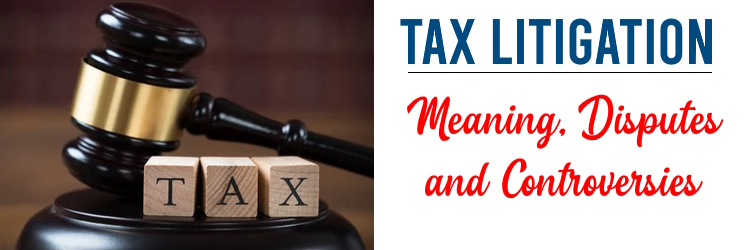Tax Litigation | Meaning | Understanding the Disputes and Controversies
Table of Contents
- 1 What is Tax Litigation?
- 2 Disputes and Controversies in Tax Litigation
- 2.1 Tax Disputes and Controversies
- 2.2 Tax Laws and Regulations
- 2.3 Tax Assessments, Audits, and Appeals
- 2.4 Tax Fraud and Evasion
- 2.5 Tax Penalties and Interest
- 2.6 Tax Treaty Disputes
- 2.7 International Tax Disputes
- 2.8 Tax Planning and Avoidance
- 2.9 Tax-Related Criminal Investigations
- 2.10 Dispute Resolution Mechanisms
What is Tax Litigation?
Tax litigation is a legal process where taxpayers, tax authorities, or other stakeholders challenge tax-related disputes in court or before other dispute resolution mechanisms. Tax litigation may arise due to differences in the interpretation of tax laws or regulations, tax assessments, tax refunds, or any other matter related to taxation. In tax litigation, the courts or dispute resolution mechanisms review the facts and evidence presented by both parties and make a final decision on the matter.
The objective of tax litigation is to resolve tax disputes fairly and effectively while ensuring compliance with tax laws and regulations. Tax litigation is a complex and specialized field that requires knowledge of tax laws, procedures, and court rules.

Disputes and Controversies in Tax Litigation
Tax litigation is a specialized area of law that deals with disputes and controversies arising from the application of tax laws and regulations. It involves a wide range of issues, including tax assessments, audits, appeals, fraud, penalties, interest, treaty disputes, and criminal investigations. Tax litigation can be complex and challenging, and requires a deep understanding of tax laws and regulations. Various disputes and controversies that can arise in tax litigation are,
Tax Disputes and Controversies
Tax disputes and controversies are the primary focus of tax litigation. These disputes can arise due to differences in the interpretation of tax laws or regulations, tax assessments, refunds, or any other matter related to taxation. Tax disputes can occur at different levels, such as federal, state, and local, and may involve various tax types, such as income tax, sales tax, property tax, and others.
Tax Laws and Regulations
Tax laws and regulations are the foundation of tax litigation. Tax laws and regulations govern the collection and enforcement of taxes, including the procedures for tax assessments, audits, and appeals. In tax litigation, lawyers need to have a deep understanding of tax laws and regulations to effectively represent their clients and resolve tax disputes.
Tax Assessments, Audits, and Appeals
Tax assessments, audits, and appeals are common areas of tax litigation. Tax assessments are the initial determination of the tax liability by the tax authorities, while tax audits are the reviews of tax returns and records to ensure compliance with tax laws and regulations. Tax appeals are the administrative procedures available to taxpayers to dispute the tax assessments or audit findings. Tax litigation lawyers can represent their clients in these procedures to resolve tax disputes.
Tax Fraud and Evasion
Tax fraud and evasion are serious offenses that can lead to tax litigation. Tax fraud involves intentional misrepresentation or concealment of facts to evade taxes. Tax evasion involves the failure to pay taxes owed by manipulating the tax system. Tax litigation lawyers can represent taxpayers or the tax authorities in criminal investigations related to tax fraud or evasion.
Tax Penalties and Interest
Tax penalties and interest are significant issues in tax litigation. Tax penalties are the fines imposed by the tax authorities for noncompliance with tax laws and regulations, while interest is the additional amount owed on top of the tax liability for the delay in payment. Tax litigation lawyers can represent taxpayers in disputes related to tax penalties and interest.
Tax Treaty Disputes
Tax treaty disputes are common in international tax litigation. Tax treaties are agreements between two or more countries to avoid double taxation and promote international trade. Tax treaty disputes can arise when the interpretation or application of the treaty is in question. Tax litigation lawyers can represent taxpayers in tax treaty disputes.
International Tax Disputes
International tax disputes involve tax issues arising from cross-border transactions, such as transfer pricing, tax havens, and withholding taxes. Tax litigation lawyers can represent taxpayers in international tax disputes, which can be complex and require knowledge of international tax laws and regulations.
Tax Planning and Avoidance
Tax planning and avoidance are legal ways to minimize the tax liability. Tax planning involves the use of legal strategies to reduce the tax liability, while tax avoidance involves the use of legal loopholes to minimize taxes owed. Tax litigation lawyers can advise their clients on legal tax planning and avoidance strategies to avoid tax disputes and controversies.
Tax-Related Criminal Investigations
Tax-related criminal investigations involve the prosecution of individuals or businesses for tax-related offenses, such as tax fraud or evasion. Tax litigation lawyers can represent clients in criminal investigations related to taxation, which can have severe consequences, such as fines or imprisonment.
Dispute Resolution Mechanisms
Dispute resolution mechanisms, such as alternative dispute resolution (ADR) and arbitration, are available in tax litigation. ADR is a process where parties can resolve tax disputes outside of court, while arbitration involves resolving disputes through an independent third party. Tax litigation lawyers can represent their clients in tax dispute resolution mechanisms such as ADR and arbitration. These lawyers can advise clients on the benefits and drawbacks of using these alternative dispute resolution mechanisms compared to traditional litigation in court. They can help clients navigate the ADR or arbitration process, including negotiating with the opposing party, preparing evidence and arguments, and presenting their case before the third-party neutral.
In addition to representing clients in ADR or arbitration proceedings, tax litigation lawyers can also assist clients in settling tax disputes with tax authorities. They can help clients negotiate settlements and payment plans with tax authorities, as well as appeal decisions to higher authorities if necessary. Tax litigation lawyers may also provide advice on tax planning and compliance to help clients avoid future tax disputes. Overall, tax litigation lawyers play a critical role in helping taxpayers navigate the complex tax dispute resolution landscape and protect their rights and interests in tax matters.
in


